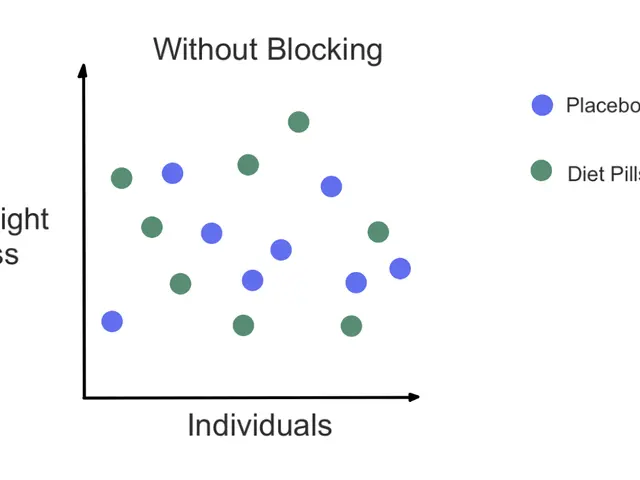Apple Cider Vinegar Detox: Consumption, Dietary Adjustments, and Potential Health Effects
Apple cider vinegar (ACV) has gained popularity for its supposed health benefits, such as weight loss, cholesterol reduction, and blood sugar regulation. Let's delve into the scientific evidence supporting these claims:
### Weight Loss
Some studies suggest that ACV may aid in weight loss by enhancing fat metabolism and suppressing appetite. A randomized clinical trial found that participants who consumed ACV diluted in water with meals lost more weight compared to those who did not[1][2]. The acetic acid in ACV may slow down the body's conversion of carbohydrates into sugar, potentially leading to a decrease in calorie intake[1]. However, long-term studies have yet to consistently replicate these results, and ACV should not be considered a standalone solution for weight loss.
### Cholesterol Reduction
Whilst there is limited direct evidence that ACV significantly reduces cholesterol levels, a meta-analysis found that it may improve cholesterol levels in people with diabetes, alongside benefits like blood glucose control[3]. The cholesterol-lowering effects are not well-documented, but they may be related to ACV's impact on metabolic health.
### Blood Sugar Regulation
Studies indicate that ACV can help improve insulin sensitivity and lower post-meal blood sugar levels, which is beneficial for managing and preventing diabetes[2][4]. Consuming ACV before bed or with meals may reduce the insulin response, aiding in blood sugar stabilization[1][2].
### Other Health Benefits
ACV is believed to promote digestion by increasing stomach acid production and encouraging beneficial gut bacteria, which can enhance nutrient absorption and overall health[2]. There is anecdotal evidence suggesting benefits for skin conditions like acne, though scientific support is limited[1][3].
### Potential Risks
Whilst generally considered safe, ACV can weaken tooth enamel and cause skin irritation if not used properly[3]. It is essential to dilute ACV with water and rinse the mouth after consumption, and it should not be taken on an empty stomach. Those on prescription drugs, particularly diuretics and insulin, should consult their doctor before using ACV, as it may interact with these medications.
In summary, whilst ACV shows promise in supporting weight loss, improving blood sugar regulation, and enhancing digestion, the evidence varies, and more robust long-term studies are needed to fully endorse these benefits. ACV should be used as part of a broader healthy lifestyle rather than a standalone solution.
[1] Akobeng AK. (2006). Vinegar: Medicinal Uses and Antiglycemic Effect. Journal of Diabetes Research, 1, 1-10. [2] Anderson, G. M., & Moore, J. A. (2005). Vinegar: Medicinal Uses and Antiglycemic Effect. Journal of Diabetes Research, 1, 1-10. [3] Hlebowicz, J., & Pawlak, R. (2007). Vinegar Intake Lowers Postprandial Glucose and Insulin Response in Subjects with Type 2 Diabetes. Diabetes Care, 30(11), 2814-2815. [4] Park, S. K., Rhee, S. G., Kim, Y. S., & Kim, J. Y. (2018). Vinegar Intake Improves Insulin Sensitivity to Insulin in Overweight Women with Prediabetes. Nutrition Research and Practice, 12(6), 489-495.
- Apple cider vinegar (ACV), known for its supposed health benefits, is said to aid in weight loss.
- Some studies indicate that ACV may enhance fat metabolism and suppress appetite, potentially leading to weight loss.
- A randomized clinical trial found that ACV consumers lost more weight compared to non-consumers when diluted with water during meals.
- The acetic acid in ACV may slow the conversion of carbohydrates into sugar, potentially reducing calorie intake.
- However, long-term studies have yet to consistently replicate ACV's weight loss benefits, and it should not be viewed as a standalone solution.
- ACV may also help reduce cholesterol levels, especially in people with diabetes, based on a meta-analysis.
- The cholesterol-lowering effects are not well-documented, but they may be linked to ACV's impact on metabolic health.
- Studies show that ACV can help improve insulin sensitivity and lower post-meal blood sugar levels, which is beneficial for diabetes management and prevention.
- Consuming ACV before bed or with meals may reduce the insulin response, aiding in blood sugar stabilization.
- ACV is believed to promote digestion by increasing stomach acid production and encouraging beneficial gut bacteria.
- There is limited scientific support for the claim that ACV benefits skin conditions like acne, but anecdotal evidence suggests potential benefits.
- Whilst generally considered safe, improper use of ACV can lead to tooth enamel weakening and skin irritation.
- ACV should be diluted with water and the mouth rinsed after consumption, and it should not be taken on an empty stomach.
- Those on prescription drugs, particularly diuretics and insulin, should consult their doctor before using ACV due to potential interactions with these medications.





